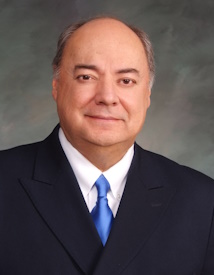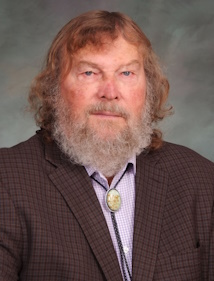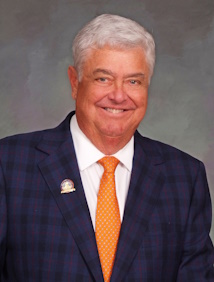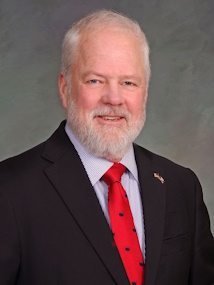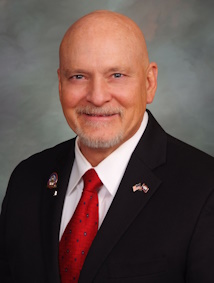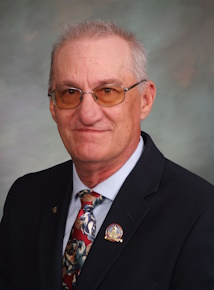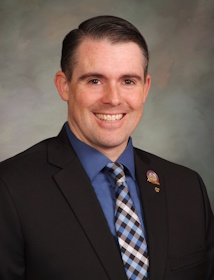The Freedom Caucus goes after the University of Wyoming. Why? We Don't Need No Education.
This is the main university that educates our kids in Wyoming. They don’t have three other choices like they do somewhere else. This is what we have. This body is sending the message to the people of Wyoming, our own people, ‘Don’t stay here. Don’t come here.’”
Ogden Driskill.
Driskill is exactly correct. This is what he was discussing:
Lawmakers decimate UW’s state funding request
Wyoming’s right-wing appropriators slashed more than 12% of UW’s requested funds, including the total defunding of Wyoming Public Radio, and a near-blanket $40 million cut across campus.
I want to first note that I've really struggled with this entry, as I didn't want to sound condescending. I've probably failed, but I don't mean to be, if I have.
Thing is, I think the WFC, which is responsible for this looming disaster, is a bit condescending.
I was in attendance of a gathering of legislators this past week, most of whom were experienced legislators outside of the Wyoming Freedom Caucus, one new member who was outside of it, from a teaching background, and horrified by what they were doing, and one new member who was clearly way out to sea and three was a demeanor perhaps best characterized by ultra befuddlement. One of the long time members of the salons, in referencing this story, let slip the truth in full, before retreating on it. He noted the members of the Joint Appropriations Committee are largely new, now that the WFC has seized control of the legislature, which is against the norm, and that they aren't from here.1 Some, he noted "haven't even been to university", before he went on to qualify that as being fine, "but".
Here's the members of the committee:
Senators
Representatives
Not all of these people are members of the Freedom Caucus, but a majority are. Driskill isn't and Sherwood definitely isn't. Bear, Allemand, and Pendergraft are.
What does the Freedom Caucus have against UW?
They favor ignorance.
That no doubt sounds harsh, and it is, but it's very much the case.
Spend any time around Wyoming Freedom Caucus members at all, and you'll find that they are generally poorly educated themselves, or they have very narrow educations. That doesn't mean they are dumb, although at least one of these guys is about as sharp as a spoon. Those who are educated, were not educated here, although quixotically, John Bear, who is a major figure in this movement, was educated at CSU and has a degree in economics.2
You can generally figure out how these by looking up their legislative biographies and doing a slight bit of digging. Take, for example, the well respected conservative, but not Freedom Caucus, Driskill:
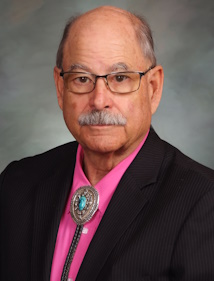
Republican
Senate District 01: Senator Ogden Driskill
Bear called Driskill a "doofus" the other day, which is particularly unwarranted. Driskill is pretty far from a "doofus".
Driskill went to Casper College and obtained an associates degree, and apparently attended, but did not graduate from, the University of Wyoming. He didn't list a religion, but a little digging reveals he's an Episcopalian.
Let's look at another 1977 high school graduate, Bill Allemand, who is in the WFC.
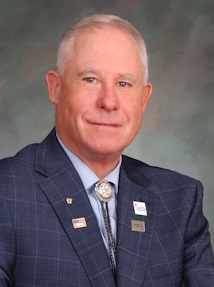
Republican
House District 58: Representative Bill Allemand
We have a "don't vote for list" coming out, and Allemand is on it. He's anti access to public lands. Based on a recent news story, he has an odd relationship with alcohol, as he was picked up for drunk driving and indicated, according to the news, that he says he drinks while driving to address stress, or so the newspaper stated he stated.
Anyhow, no education is listed at all.
His campaign site notes he graduated from high school in 1977 and moved to Kansas to run a trucking company. There's nothing wrong with that, but it's a pretty narrow weltanschauung that might give you. No spouse is listed, which probably represents a divorce, although he could be widowed. He lists his religion as "Christian".
Allemand was one of the legislators who revealed to have been given a script for a hearing this past week, with that being excused on the basis that he's green in the legislature.
He's on his second term. . .
Let's look at the Democrat.

Democrat
House District 14: Representative Trey Sherwood
Minority Caucus Chairman
Hmmm, she has two degrees focusing on history, and she lists her religion as Lutheran.
Okay, what's up?
Well, with the Freedom Caucus people we tend to find that they're not well educated, or that they have very narrow educations, although there are exceptions, such as Bear. And they tend to list their religion as "Christian".
So am I "anti Christian"?
Not at all. I am a Christian. But what I find interesting about these listings is that what they tend to mean by Christian doesn't mean being a member of the Church founded by Christ or one of the original dissenting churches that recognized the Catholic Church as the original Church, as the Lutheran Church, Presbyterian Church, Episcopal Church and Methodist Church all did, but sought a reformation of it, by their claims, but rather being a member of a Church that claims a Christian view and was founded by an identifiable human being, who was probably an American or where the church was highly developed inside the U.S.3
Take John Bear, for instance, one of the exceptions, as he's well educated. A while back I read a story on him, which included a terrible tragedy his family endured (and it was terrible). It noted he's a member of the Evangelical Free Church. The The EFCA was formed in 1950 from the merger of the Swedish Evangelical Free Church and the Norwegian-Danish Evangelical Free Church Association, so it has its roots in Scandinavian Protestantism outside of the Lutheran Church, the latter of which was the official state religion up until after World War Two, and which was imposed upon the Scandinavians by force against their will (they wanted to remain Catholic). Indeed, the Swedish Evangelical Free Church is a Baptist Church and all Evangelical Free Churches adhere to Radical Pietism It's what adherents of its sort of views call a "Bible Believing Church" which means that they reject the first 1500 years of Christianity largely because they are unaware of it and therefore, ironically, they do not believe in all of the Bible.
Let's look at another WFC member:
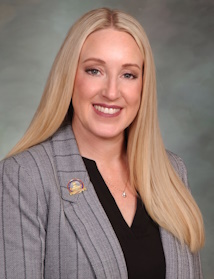
Republican
House District 03: Representative Abby Angelos
Again, no education listed save for high school, and religion is listed as "Christian".
The charmingly named Angelos would suggest that somebody in her husband's family was Greek, but apparently lost their faith in the Apostolic faith somewhere along the way, which is a danger in the Orthodox community as it does not seem to share the Catholic canon of mandatory attendance. It's also a marked feature of the agricultural community, quite frankly, as it was difficult for isolated ranchers to attend Mass or Divine Liturgy, and so they lost their original faith or became very loose in adherence to it.4 In its place a sort of loosely organized Christianity sprang up, with many Christian tenants ignored not really grasped.
John Ford gave a really nice portrayal of Western frontier Protestantism in The Searchers, even though Ford was Catholic. Indeed, he gives a nice and very sympathetic portrayal of it in several films, with this one being the best perhaps for the simple reason that the Ethan character in the film is irreligious. Another really good one is given in Sam Peckinpah's Major Dundee, in which the Protestant minister is one of the combatants. Peckinpah was raised in a very strict Presbyterian household. Wayne, who became a very late in life Catholic convert, was in another frontier minister film that does a good job with the topic, The Shepherd of the Hills. In any event, Ford's observations are very keen i the way that only somebody who is religious themselves can be about another religion.
Digging in a little shows Angelos to be a member of Gillette's "Family Life Church", which claims to be "non denominational" even though there's utterly no such thing. So, no doubt, it's a "Bible believing" do it yourself church that likely has a very poor understanding of Christian history, theology, and perhaps even Christianity. Indeed, it's website claims its "Christ centered" which any Christian church would have to be without claiming to be.
Here's another example:

Republican
House District 04: Representative Jeremy Haroldson
Speaker Pro Tempore
Haroldson is a WFC member. He has an education, but it's basically a technical school type education, which is definitely an education, but not a liberal arts education. He's an Assemblies of God pastor, which is a Pentecostalist "Bible believing" Protestant Church that's popular, for some reason, with rural communities.
Um, okay, so what?
The first real attacks I heard on the University of Wyoming were by the fellow who caused this event to come about:
Charlie Kirk speaks at UW, focusing on race, education and Trump
I guess that's not entirely true, as the movement that caused Kirk to show up was active before that. Frankly, it was mostly amusing at first, as it was a collection of young (men) people who organized to complain about how liberal the University of Wyoming was while attending it. The prime mover of that organization is somebody I heard holding forth in a casual setting once, addressing a group of people he assumed to be uneducated, and he really held forth on how liberal professors were poisoning the minds of young people, a common theme of people in the Kirk orbit.5
Now, there's a lot to dig into this group of folks and their overall world outlook.6 We'll do that elsewhere, and that doesn't relate to this at all.
So, what's the point?
Just this, while individual members of the Freedom Caucus are educated, or are not members of a do it yourself sort of poorly catechized Christianity, that theme runs through the entire group, and it runs through the entire Charlie Kirk branch of Protestantism. And as they are poorly educated in general, to include religion, they don't trust education, as its adverse to what they want to believe.
Educated people generally have open minds, which does not preclude them from being conservative. William F. Buckley, for example, or George F. Will, are certainly well educated and conservative. Generally, however, educated people are more likely to embrace some ideas that are "progressive" or "liberal", or which are neither but which people very entrenched on the right regard that way, or they are at least likely to have nuances or exhibit tolerance.
A good example of that with well formed Catholics is is that climate change is caused by humans and we need to do something to arrest, and reverse it. You can definitely find well educated people who dispute this, although it's a declining number.
It gets confusing when you get to social issues, which is why I think we've seen Catholic fellow travelers with some of these groups, who are not part of these groups.7 Abortion is a good example. Catholics have been opposed to abortion since day one, but how have been joined by right wing protestants. A lot of well formed Catholics are also opposed to the death penalty, and have been for a long time, but you won't find this to the case with right wing Protestants as a rule.
And we could go on and on. Lots of "conservative" Catholics are also pretty concerned about the environment, which puts them on the left in that area. Plenty of Catholics have real formed opinions against starting wars, any war, which also puts them on the left, although that's not universally true. You won't, however, hear Protestants debating on whether a particular action comports with the Just War Theory.
And finally, as a rule, Catholics are huge on education. The Big Bang Theory, after all, is our idea, as is the roots of the theory of evolution. Quite a few people in the far Evangelical right would insist that those are fibs.8
In short, some of the things taught in universities, but certainly not all, run contrary to what the far right of the Evangelical movement holds, particularly, but not exclusively, in regard to science. Indeed, this very topic comes up frequently for Catholics as somebody will ask us if we believe in science or religion, and we look baffled, and say, well, both, which is true. The far right in Evangelicalism however, can't. And because the evidence in science is frequently irrefutable, it does in fact cause a crisis for those who are deep into it when they start to study it.
That's not all of it however.
In the debate on hacking money away from the UW block grant, it was clear that, in spite of what was said, that the feeling was that UW has some liberals lurking in the woodpile that need to be smoked out. Indeed, this is so much the topic of far conservative angst that the very conservative Claremont Institute has published an entire article on it. There are specific courses that they detest, often having to do with things they regard as Woke, and they don't like Wyoming Public Radio, which is housed at UW. One of the legislators, Haroldson, compared it to Pravda, which is absurd, but which reflects a long held conservative distaste for media and general and public media in particular, as they regard it as biased. It's regarded that way as its reporting is straightforward and it'll cover unpopular topics.9]
You won't find too many Freedom Caucus members listening to NPR's Science Friday.
In contrast, you will find some, I'd guess, that listen to an Evangelical radio station in Casper which unironically runs a really long item by a guy who is adamant that the world is only 5,000 or so years old and who likes to go to National Parks and confront the science lectures of Park Rangers with that. He conceives of them being overawed, when in fact it's clear that they think he's an anti scientific nut.
And that gets to the heart of it in general. Folks in the Freedom Caucus are afraid of education, as people learn that the world isn't 5,000 years old, that evolution is real, and that climate change isn't a fib. They can't stand that as it deeply upsets their world view. Evolution, the age of the Earth, and climate science aren't a threat to Catholics, the Orthodox, or mainline Protestants as they accept that faith can be informed by science. It is a a deep threat to "Bible believing" Christians as they can't reconcile any of those things with the literal text of the Bible, even though they're perfectly content to flat out ignore big chunks of the Bible that Apostolic Christians in fact take literally.
The other thing that these groups are flat out ignorant on is history.
This often comes through in economic debates or in campaigns. Listen to them, even though most of them aren't from here, Wyoming came about when hardy pioneers crossed the barren plains and carved out a civilization from the raw wilderness.
Which is bull.
Well, not completely bull, but at least partially bull.
In reality, Wyoming was a major benefactor of the American System in which the Federal Government heavily invested in the economy to give private enterprise a start. The US removed the original inhabitants of the land by armed force, subsidized the building of the railroads, guarded the trails with Federal troops, and gave away land with bare minimum proof of effort. In 2026 the US would never do any of that, but its legacy, including the completely absurd legacy that the owners of land that was given away solely for agricultural purposes now own the minerals, including the oil and gas, below where the grass grows.
Now, I'm a huge fan of history, including Wyoming history, and I'm an agriculturalist as well as a lawyer, and I wish I'd lived back when you could homestead. More than that, if I could have lived when free and company trappers were the only European Americans out here, I would have loved to have done that. But none of that should mean that we take a They Died With Their Boots On view of history let alone our own state. Frankly, the repeal of the Homestead Act after Franklin Roosevelt saved the state and made it was it is, and we ought to be grateful.
Finally, the other thing that's going on is a guerilla campaign in the Culture Wars. College campuses really are more liberal than any other American institution, followed probably only by the Bar.10 Even this, however, isn't very uniform.
As noted here before, I came up in the sciences. By and large, people in the sciences couldn't, at the time, be characterized as left or right. I've heard that certain Charlie Kirk acolyte rail against "liberal professors", but that's because he was a political science major. Who did you think you were going to find there? Other than sociology, that's no doubt the most likely to be left wing major that there is. It's also a major that only leads to teaching or the law, so in a way its a self refining pool of people. People with political science degrees will generally find that the professors are center to left of center. Lawyers as a rule are center to left of center, even if they didn't start out that way, as they have to work with real people. Far right lawyers, of which there are some, aren't going to probably do very well in a profession where your clients are basically in the category of desperately needing help.
Universities, it might be noted, have become more liberal since the Second World War, that being another impact of WWII that I failed to note in my large post on that topic. The reasons were several fold, the first being the massive government investment in universities, which were providing necessary technological knowledge, and manpower, as universities were training needed professions as well as directly training officers. An officer during the Second World War was much more likely to have come out of a university than a military academy. This relationship kept on right after the war and it still exists today.
But beyond that, the GI Bill sent thousands of men to universities who would never have otherwise gone.
All of this created a new condition in which universities started taking in government money, and then became dependent up on it to a degree. It shifted the center of gravity in various academic fields, but not all of them, away from liberal arts degrees that were fairly narrowly focused to much broader ones. This expanded existing degree programs as well. Having said all that entirely new fields were not created anywhere as much as people like to think. CU, for example offered political science classes all the way back to the 1910s, although the department was created in 1957.
So here's the one area that they have a point on. In some fields, not all, some professors, not all are fairly liberal, because that's where they can find a professional homes. Prior to World War Two, and even more, prior to World War One, that's where a certain type of tweedy right wing academic found a home, funded as it were by old money that funded the universities. Now it's sort of flipped.
But how many professors is that really?
My academic experience is quite a while back, but even at that time some of the things the populist right regards as "woke" were around. I don't think I had a single undergraduate professor that I'd regard as left wing, but then again, my major was in a hard science. In law school I can think of a single professor that I'd regard as slightly left of center, but there were quite a few students who were very left of center. Those students were in the political left when they got there.
Indeed, thinking again of my undergraduate years, just after the Siberian land bridge closed, there were a fair number of students in the hard sciences that were left of center. I'd guess that there was probably a single student I knew, a grad student, who was definitely in the political right. Most of the rest of us were not.
And that's some the Freedom Caucus needs to consider.
It wasn't our university education that made us geology students slightly left of center. Were were slightly left of center going in. That doesn't mean we were flaming radicals either, I'd note. But we weren't right wing populists. We were pretty cautious, as budding scientists, about right wing views on many things, and now that I'm approaching four decades out, my views have returned to the same as they were on politics for the most part. Indeed, they've evolved hardly at all there. They have evolved on social and religious views, where I've become more conservative over time, but at the same time, I've become more learned on the same topics, which has driven that.
Which is why the Freedom Caucus needs to get a little education itself. It's grasp of the history of the state and its economics is abysmal. They need more of the opening of Red River and all of Little Big Man and less of the end of They Died With Their Boots On.
The University of Wyoming is the state's only four year college, in part because it fought tooth and nail to keep there from being any others. Hurting UW is an ignorant thing to do.11
You shall know the truth, and the truth shall make you odd.
Flannery O'Connor.
Footnotes
1. While I'll note in this that most of the members of the WFC are ignorant in one way or another, they're certainly not stupid, and they're doing what contestants for the English crown used to do in the early Medieval period. They've seized the treasury, and therefore are, they hope, in control.
2. Bear is a CSU graduate and Navy veteran. He's originally from Missouri.
3. They would no doubt not see this, this way, but that's because they tend to be unaware of the highly developed written history of the early Church and the vast number of writings from it.
4. This is very common in the West and I've known some Catholic ranching families that lost their association with the Church in just this fashion. After a time, they don't even know that a generation or two back, they were Catholic.
This sort of thing is described in Patrick McManus' memoir in which he notes that his family lived so far out in the sticks that he was actually relatively advanced in years, age 4 or 5, before he was ware that his family was Catholic. He did remain Catholic.
5. It turns out that he was pursuing a political science degree with the goal of going to law school. It's amusing in part because political science professors tend to be liberal and come by it naturally. If you have Francoist views, as this fellow turned out to have, you aren't going to be a poly sci professor. Lawyers are, moreover, almost uniformly left of center to center, so he's setting himself up for an unhappy life.
6. The real exception to all of this is Rachel Rodriguez-Williams, who is a well educated Californian and a Catholic.
But this in and of itself is interesting. I'd defer to Fr. Joseph Krupp on this, who has discussed how for many years the pro life movement was exclusively Catholic, and then all of a sudden protestant groups started showing up. It had an influence on Catholics in that movement, which ironically helped fuel the Trad movement, although its certainly not the sole reason for it.
Catholics who are fellow travelers with Evangelicals in politics are really naive on what that means as many of these "Bible Believing" Protestants have no clue whatsoever that the Bible is a Catholic book or that Catholics are the original Christians. Rooted in the Black Myths, many of them instinctively really hate Catholics, which will come back to haunt Catholics at some point.
7. See footnote 1.
8. The US is a Protestant country, however, and you can find plenty of Catholics who have adopted heavily Protestantized views on nearly anything, often unthinkingly.
9. The comparison to Pravda is not only absurd, but ironic given that the news organs of the Trump regime might be fairly compared to the Volkische Beobacher.
10. You'll find a lot of conservative lawyers out in the practicing lawyer world, but you won't find very many MAGA ones. There are some, but they're a minority.
Interestingly, when Liz Cheney got into trouble with the electorate here because of her views, the lawyers were really in her corner. I never heard a single lawyer criticize Cheney, and lots of them were very vocal in their support of her. I'd get rare comments from out of state lawyers, who were usually surprised by the stoney silence such comments made, assuming as they did that all Wyomingites hated Cheney.
Lawyers never did, and for that matter, most professionals didn't either. That's still the case, and frankly most of the professional community, including ardent conservatives, are not happy with any of the state's Congressional delegation.
11. For years I thought I saw this coming, I'd note, but not where it actually came. I thought it'd be the law school that would get attacked.
Law schools tend to regarded as liberal by default, and populists tend to hate the law as it restrains them from doing what they want to do, right up until the forces of nature whip around on them and they need protection from the law. Frankly, I fear we're getting there very quickly as Trump's unhinged nature is starting to provoke violent resistance to his programs, and the populist insurrection on January 6, 2020, has given Trump's most radical opponents a blueprint. If the cabinet or Congress doesn't force Trump into the nursing home soon, I suspect very soon that the administration may experience its own January 6 event.
Anyhow, I thought for years that the legislature would turn on the law school, but it hasn't. It might be because, up until very recently, there were quite a few lawyers in the legislature.
That's no longer true, and the lousy quality of some of the legislation that gets passed shows that. Lawyers belong in the legislature. Indeed, there's been a recent effort by some of the legal associations to recruit them back into it, without much success.
Sic transit gloria mundi.
Anyhow, the law school probably averted this by doing a good job of making itself irrelevant. The UBE has really damaged it, and the practice of law in Wyoming in general.


